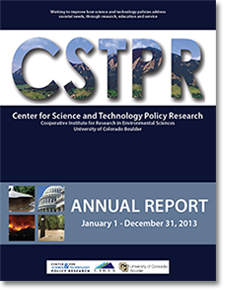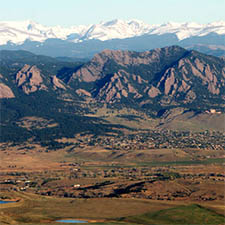CENTER NEWS |
|
New CSTPR Donations Page |
|
 |
CSTPR has a new page through which donors can make gifts to individual Center projects as well as to general Center operations. All gifts are processed through the CU Foundation and are tax deductible to the extent allowed by law (click here for details). Please consider supporting new and innovative Center initiatives by visiting our donation page. |
CU Political Scientist Steve Vanderheiden Joins CSTPR Faculty |
After graduating with his Ph.D. in Political Science from the University of Wisconsin, Madison, Steve spent time as a professor at the University of Minnesota, Duluth before joining CU Boulder in 2007. Since joining CU, Steve describes his research as working at “the intersection of the social sciences and humanities,” with a focus on issues related to international climate politics and a specific interest in how values affect the governance process, “whether as constraints or criteria for the evaluation of policies or institutions.” His book Atmospheric Justice: A Political Theory of Climate Change (Oxford, 2009; winner of the 2009 International Studies Association’s Harold and Margaret Sprout award for best book in international environmental politics) addresses such issues and provides a framework in which the idea of environmental justice can enter into global climate policy. Steve’s current research projects focus on equity and accountability in adaptation governance, as well as in carbon accounting and informational governance that will allow him to “utilize more of my social science training (as opposed to the more normative analysis of most of my past work), including some fieldwork and interviews, that should help me expand my research acumen and really work on some interesting projects.” For more information visit Steve’s CSTPR webpage. Welcome Steve! |
2013 CSTPR Annual Report Now Available |
The research described in this annual report reflects both our collective and individual efforts to pose and pursue important questions at the intersection of science and policy. Our work is shaped by several factors, especially the curiosity-driven interests of Center faculty, post-docs and graduate students, the big policy questions of our times, and the opportunities that the Center creates for collaborative research. |
Roger Pielke’s New Book on Disasters and Climate Change |
The book has been described as: “informative, lucidly written, and has some very good insights”, by Professor Judith Curry, School of Earth and Atmospheric Sciences, Georgia Tech “better than most at approaching [the topic] with a clear head”, by Sean Sublette, Chief Meteorologist, ABC 13 News, Lynchburg, VA “a valuable and timely contribution”, by Prof. John McAneney, Managing Director, Risk Frontiers, Macquarie University “highly informative, engaging, and thought provoking”, by Prof. John Michael Wallace, Department of Atmospheric Sciences, University of Washington “a welcome beacon of light on the science of climate change and extreme weather events”, by Dr. Peter J. Webster, Former President, Atmospheric Section: American Geophysical Union and Professor, School of Earth and Atmospheric Sciences, Georgia Institute of Technology “I would urge anyone interested in the climate debate, skeptic or advocate alike, to read this book”, by Dr. Doug Hoffman, The Resilient Earth blog “compelling”, by William Hooke, American Meteorological Society “brief, powerful, and timely”, by Fabius Maximus Blog |
Lisa Dilling to Lead New NOAA Sectoral Applications Research Program Project, “Balancing Severe Decision Conflicts under Climate Extremes in Water Resource Management” |
|


 The Center for Science and Technology Policy Research is pleased to welcome Steve Vanderheiden as a new faculty member. Currently an Associate Professor in the Department of Political Science here at the University of Colorado, Boulder and a Professorial Fellow with the Centre for Applied Philosophy and Public Ethics (CAPPE) in Canberra, Australia, Steve is very excited to join CSTPR. “Although I have known and worked with most of its faculty over the past few years through our affiliations with ENVS, I have not played any kind of role in the Center during that time,” Steve states. “Given my relevant research interests, I’m keen to contribute.”
The Center for Science and Technology Policy Research is pleased to welcome Steve Vanderheiden as a new faculty member. Currently an Associate Professor in the Department of Political Science here at the University of Colorado, Boulder and a Professorial Fellow with the Centre for Applied Philosophy and Public Ethics (CAPPE) in Canberra, Australia, Steve is very excited to join CSTPR. “Although I have known and worked with most of its faculty over the past few years through our affiliations with ENVS, I have not played any kind of role in the Center during that time,” Steve states. “Given my relevant research interests, I’m keen to contribute.” The Center’s 2013 annual report is
The Center’s 2013 annual report is 
